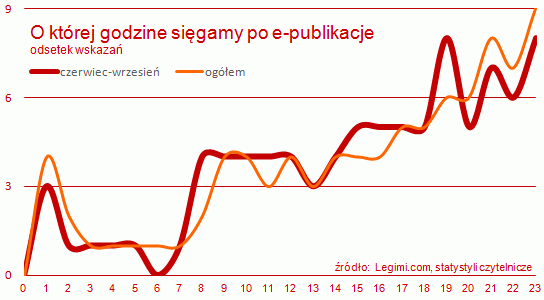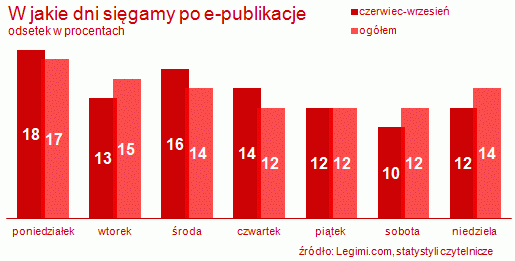
Summer shows a more evenly spread tendency to read digital publications throughout the day. However, evenings clearly dominate, especially late evenings, with a noticeably higher percentage of e-readers at the end of the day.
For Android devices, peak reading times during summer were at 2 p.m. (14% of respondents) and 9 p.m. (10%); iPad users read most around 8 a.m. and 4 p.m. (13% each), while iPhone e-book readers usually read at 9 p.m. (28%) and 1 p.m. (18%) - according to the study authors from Legimi. This indicates that smartphone users (both Android and iPhone) prefer reading during lunch and late in the evening.
Interestingly, according to analyses from the digital publications platform, e-reader owners are less predictable, reading at different times of day and night. 3% of respondents reported using their reader between 1 and 2 a.m., 5% at 9 a.m., 8% at 6 p.m., and 9% at 10 p.m. When combining results across all devices, peak reading times were in the late afternoon and evening (6 p.m. and 11 p.m. - 9% each).

One might think weekends are when we read the most. However, this isn’t true, as e-book and e-newspaper readers report otherwise. Summer weekends saw noticeably less reading than weekdays, with Monday, Tuesday, and Wednesday standing out. - This may be because popular weeklies, also available in digital editions, are released on those days - suggest the study authors.
Outside of the vacation period, Android phone or smartphone users typically read at the beginning of the week (32% on Monday, 23% on Tuesday, and only 2% on Sunday).
COMMERCIAL BREAK
New articles in section Media industry
Tags, hashtags and links in video descriptions. Youtube SEO after Gemini AI update [ANALYSIS]
BARD
Once, positioning a video on Youtube was simple. It was enough to stuff the description with keywords and wait for results. Those days are not coming back. In 2026, the algorithm is no longer a simple search engine that connects dots. It is the powerful Gemini AI artificial intelligence that understands your video better than you do.
Freelancers 2025 in media and advertising. Useme report
Krzysztof Fiedorek
The modern media and communication market presents entirely new challenges for independent creators. Traditional services are giving way to more complex forms of messaging. The most popular industries in which Polish freelancers operate focus on companies' online presence and visual content.
Video content in Poland. What and how we watch
Paweł Sobczak
Video content is watched remotely, but streaming services are mainly enjoyed in the comfort of home. This is how the consumption of audiovisual content by Poles in 2025 can be summarized. This is the result of an analysis of a study conducted by SW Research and data from the company MEGOGO.
See articles on a similar topic:
User Generated Content. A minefield for journalists and media
Krzysztof Fiedorek
Over 40% of internet users judge information credibility by likes and views. Only 20% use traditional news channels as a main and first source. A Reuters Institute report highlights the scale and risks of User Generated Content and offers advice on how media can avoid falling into its trap.
Anti-Ukrainian Propaganda in Polish Internet. Demagog and IMM Report
Katarzyna Ozga
In 2024, nearly 327,000 Polish-language posts and comments were published, negatively referring to the Ukrainian community. Among the accounts spreading anti-Ukrainian narratives with the greatest reach on platform X and Facebook was the profile of MEP Grzegorz Braun.
Repression Against Media: Committee to Protect Journalists Report for 2024
Krzysztof Fiedorek
In 2024, at least 361 journalists worldwide were imprisoned, often for exposing the truth. In China, reporters are tracked using advanced facial recognition systems, in Israel, Palestinian journalists are jailed without trial, and in Myanmar, journalist Shin Daewe received a life sentence for... a drone.
Hate speech is contagious and leads to harm [EXPERT OPINION]
Karolina Kropiwiec
‘If we are in an environment where certain groups of people are insulted, there is a high probability that we will start using such language ourselves; hate speech is contagious and its consequence is someone's harm,’ says Dr. Michał Bilewicz from the Centre for Research on Prejudice at the University of Warsaw.





























